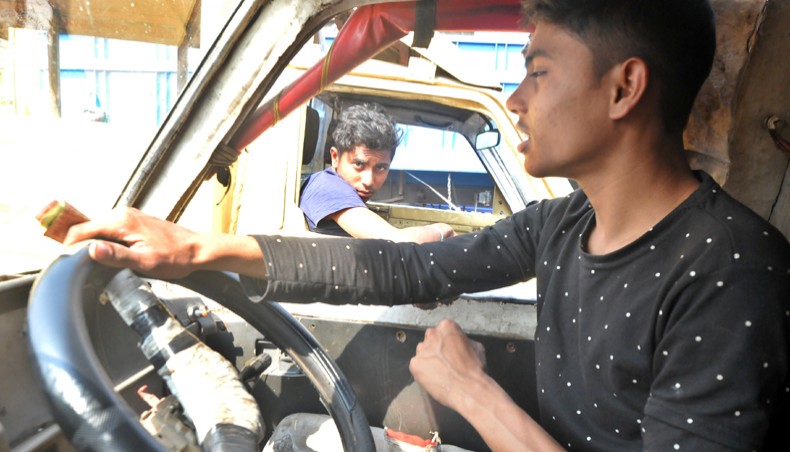Deaths due to reckless driving on rise
Casualties mainly due to reckless driving have once again spiked rendering futile all efforts of the authorities concerned to bring down the number of deaths in road accidents.
Even the road safety directives given by the prime minister, backed by those of the Higher Court, administration and law enforcers, have brought hardly any change in the grim situation.
Four people, including a Class V student, were killed in three road accidents only in the capital on Tuesday.
In all three cases, reckless driving has been alleged by local people to be reason behind the accidents. Two roadside people and an elderly woman were killed in the accidents.
On January 28, two school-going siblings — Afifa Akter Afrin, 13, a Class VI student and her brother Afsar Ahmed, 10, a Class IV student — were killed at Keraniganj in the capital as a speeding truck hit their motorcycle. The truck driver and his assistant managed to get away.
Fellows of the schoolchildren siblings, their teachers, other school students and locals took to streets and blocked Dhaka-Mawa highway, demanding trial of the killers.
On January 25, at least 13 sleeping brick-kiln workers were killed when a coal-laden truck overturned on their shed at Narayanpur under Chouddagram in Cumilla.
The driver was running the 10-tonne truck illegally with medium driving licence, though it was mandatory to have a heavy driving licence to drive the truck. In this incident also, the driver and his assistant fled immediately after the accident.
At least eleven people were killed, including five transport workers, in road accidents in Brahmanbaria, Cumilla and Lalmonirhat on January 19.
Prime minister Sheikh Hasina on June 25, 2018 gave directives to ensure drivers’ rest every five hours, alternative drivers for long-distance transports, training for drives and their assistants, use of seatbelts while travelling and going by traffic signals.
These directives were already mentioned in Motor Vehicles Ordinance, 1983, Bangladesh Labour Act, 2009 and traffic laws while the High Court, different ministries and Dhaka Metropolitan Police had already given the same directives earlier.
But the situation remained the same as these directives are largely ignored.
Unskilled and untrained drivers, even without licences, are still one of the major obstacles to improving road safety, experts have said.
Law enforcers are regularly conducting special traffic programmes which have been proved redundant as the final result remains unchanged.
Between January 15 and February 2, amid DMP’s latest traffic discipline quarter, 1.12 lakh cases were filed, Tk 5.71 crore was realised in fines, 14,157 vehicles were seized and 471 vehicles were sent to dumping stations.
The World Health Organisation’s global status report on road safety 2018 estimates that in 2016 a total of 24,954 people died in road accidents in Bangladesh.
As per WHO report in 2015, 21,316 people died in road accidents in 2013 in the country.
Bangladesh Road Transport Authority statistics, compiled based on Bangladesh Police’s First Information Report only, also show increasing number of casualties in road accidents.
BRTA data show that 1,957 people were killed in 2013, 2,067 in 2014, 2,376 in 2015, 2,463 in 2016, 2,513 in 2017 and 2,265 were killed in the first 10 months of 2018.
BRTA chairman Md Moshiar Rahman told New Age on Tuesday that different authorities were implementing the directives of the prime minister.
Initiatives were taken by the Prime Minister’s Office to train one lakh drivers by Bangladesh Road Transport Corporation while Roads and Highways Department was building restrooms for drivers, he mentioned.
Bangladesh Road Transport Workers’ Federation general secretary Osman Ali alleged that the transport owners were ignoring prime minister’s directives to keep alternative drivers on long route buses and give them appointment letters or monthly salaries.
‘It’s inhuman to force a single driver to drive on Dhaka-Cox’s Bazar route,’ he explained.
Osman claimed that BRTC’s training was not enough to meet the demands.
Bangladesh Road Transport Owners’ Association secretary general Khandaker Enayet Ullah claimed that they could not fulfil prime minister’s directives on keeping alternative drivers on long-route buses for a shortage of 13 to 14 lakh drivers.
The shortage of drivers against vehicles was a problem for the sector for more than 10 years, he observed.
‘Moreover, the drivers frequently change jobs and that is why we cannot appoint them on monthly salaries,’ Enayet Ullah continued.
Till January this year, the total number of registered motor vehicles in the country is 38.5 lakh, including about 20 per cent permanently off-street vehicles, while the number of total driving licences is 19 lakh till August 2018.
News Courtesy: www.newagebd.net











